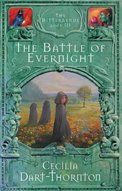
| Series: | The Bitterbynde #3 |
| Publisher: | Tor |
| Copyright: | 2002 |
| Printing: | 2004 |
| ISBN: | 0-330-48957-7 |
| Format: | Mass market |
| Pages: | 634 |
This is the third book in the Bitterbynde series and builds heavily on the previous books, particularly The Lady of the Sorrows. As much as it might be tempting to skip all the words that came before, the backstory is important for this one.
As before, there is a plot twist in the middle of The Ill-Made Mute which is essentially impossible not to spoil when talking about any later book. There is also substantial world information revealed in the second book without which the third would make little sense. If you prefer to avoid spoilers for the first and second books, you probably should not read this review.
The flurry of revelations and background revealed at the end of the second book were a definite improvement in the pace of this series, but alas the pace couldn't last. The start of The Battle of Evernight returns to yet another interminable journey across the length and breadth of Eldaraigne, filled with yet more exotic locales and dangerous wights (not to mention voluminous descriptions and obscure words). I have to admit I found this rather tedious, particularly given that we're now subjected to the constant emotional torment of the lead character. I've mentioned before that the unhealing wound (of which this is the emotional equivalent) is far from my favorite fantasy trope.
The two female companions for our protagonist never did much for me, and by the middle of the book I wanted to strangle Viviana. Thankfully, before too long into the book, we pick up some non-human travelling companions who are far more interesting, and then the annoying humans get whisked away to the significant improvement of the story. Some of the latter half of the extended journey is therefore more interesting than the first. The hedge maze region in particular is a lovely, inventive bit of fantasy landscape.
This is all prologue, though, and largely irrelevant prologue at that except to build a few friendships at the speed of drying paint and growing grass. The actual story starts around page 322, and even then we get some scene-setting and faffing about mixed in with large swaths of backstory. The backstory, though, is well-done and does a great job not only of systematically untangling the plot of the previous two books but coming up with excellent, world-consistent reasons for most of the annoyances and oddities of the previous volumes. I'm not sure the deftness of the justification makes up for the annoyance at reading yet more love at first sight, but I must say it's nicely done within the mythical system that Dart-Thornton has constructed.
She's also excellent at writing over-the-top battles of faerie. It's only a small part of a very extended book, but the climactic battle of Evernight was everything I could have hoped for. Dart-Thornton's extended and sometimes labored descriptions serve her well here. She knows how to sing the numinous glory of creatures who are above and apart from humanity, she mixes in some old-fashioned advance planning and use of handicaps to advantage, and the battle satisfies both plot requirements and the emotional desires of the reader.
And then it's over, we're at page 493, and there are well over a hundred pages left to go. Like everything else about this series, the denouement will not to be rushed. To be fair, there are some major loose ends left to be tied up), but the rest of the book dragged and I could have done without the return to dangerous encounters with evil creatures and characters making obviously stupid decisions out of fear. It works thematically to put a sharper and more dangerous edge on the ending, but I was fighting series fatigue by this point and wanted things brought to a conclusion a bit more promptly.
The ending, though, is nicely done, avoiding both too-obvious happiness and depression and balancing the concluding emotions rather well. I was highly amused the author added an afterword to explain just what happened since apparently the hardcover version was too opaque, but I must admit I appreciated the conclusive explanation.
All in all, I think this series is far too long and contains too many words for me to recommend it. There are some beautiful descriptions and several stretches of thoroughly enjoyable writing, but there were at least 500 pages, and probably more like 1,000, that I could have done without. Pick this up only if you have a strong appetite for extended description and are willing to let the story pick its own pace. But if you are, it has a nice payoff and a wealth of interesting mythology.
Reviewed: 2008-04-10